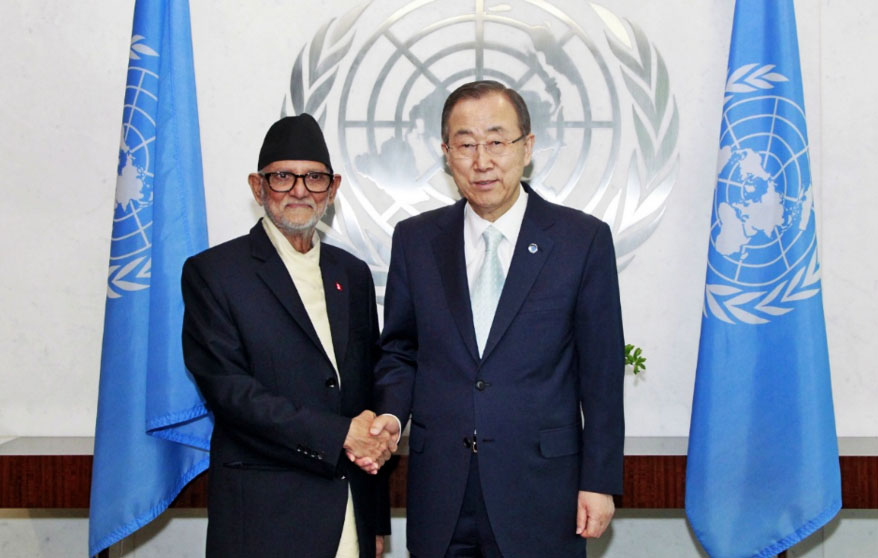Ex-PM Koirala meets UNSG Ban in New York, expresses concerns over border blockade
KATHMANDU: Former Prime Minister and President of the Nepali Congress, Sushil Koirala, has called on the United Nations Secretary-General, Ban Ki-moon, at the UN headquarters in New York.
In the meeting on Wednesday, the Nepali Congress leader and UN leader discussed various issues including Nepal's current political situation and obstruction at the Nepal-India border in the wake of promulgation of new Constitution.
Recalling that Nepal promulgated an inclusive and democratic constitution prepared by the people's representatives through an elected Constituent Assembly, the former Prime Minister said, "Nepal considers the United Nations as the custodian of the principles of sovereign equality of all nations. We look to full understanding of Nepal's sacrifices for democracy and contributions to the liberal democratic order from the international community."
"We want our friends to appreciate difficult circumstances and complex geopolitics that we are working with in these trying times," Koirala has been quoted as saying in a statement issued by his press coordinator Prakash Adhikari.
He further told the UNSG it has been a matter of great satisfaction that political parties with violent past, non-democratic, and non-constitutional behaviour have come under democratic umbrella.
"Everybody becomes a winner in democracy. The biggest challenge now is to institutionalise this peaceful behaviour and strict adherence to the provisions of the Constitution and rule of law," he said, "Now my desire is to see this behaviour improved, and strict adherence to democratic norms reflected in daily governance and to the solution of current challenges in the plains in a democratic manner."
Koirala thanked the Secretary-General for support and solidarity following the devastating earthquake in April.
"Nepal is working hard to address pressing challenges of reconstruction and rehabilitation of earthquake victims.
Nepal's policy has been to live with neighbours in peace, friendship, cooperation, and harmony to promote peace, stability, and development."
He recalled that the outgoing government led by him attached highest priority to Nepal's relations with its neighbours as being pillars of peace, stability, and prosperity.
He also told the Secretary-General that at a time when Nepal with constitutional democracy would have been an asset for our neighbours and the world to direct all efforts for development and uplifting people's living standard by utilising Nepal's huge natural resources for common benefit, we are extremely sad to see the Indo-Nepal relations taking this undesirable turn following the promulgation of an inclusive democratic Constitution. "The current situation that emerged as Nepal advanced towards constitutional democracy remains inexplicable," he said.
Koirala expressed his concerns over the potential growth of radicalism in the country if people's sufferings and hardships continued. "This will not be in the interests of anyone. South Asia remains the worst victim of terrorism, and violent extremism that will complicate the security scenario in the region and beyond," he said.
"It is unthinkable to find our most generous neighbour India, which came to our rescue within hours of devastating earthquakes in April silently looking at the obstructions and disruptions of the most essential supplies at the border that have crippled Nepal's economy, paralysed social life forcing the closure of schools, and halted our reconstruction efforts and rehabilitation of earthquake victims."
"The effect of border blockade has been more pervasive and lasting than the devastating earthquake of April 25 and subsequent aftershocks. Damage from the earthquake was assessed to the tune of US$ 7 billion under Post Disaster Needs Assessment."
"It is estimated that the cumulative loss from this action of obstructions and disruptions far significantly exceeds that amount. Pushing Nepal into the most serious humanitarian crisis in Nepal is not in the interests of any one. He underlined the need for Nepal's unhindered right of free transit, and appreciated the UN position on this."
"Nepal deserves better treatment as one of the poorest, landlocked and least developed countries that formulated a democratic constitution through an endogenous process by following an internationally approved democratic routes."
"We are extremely worried about the divides being created between hills and plains and among diverse ethnic groups in Nepal. Diversity is our strength and national identity. We are fiercely proud of this strength. We are determined to the preservation and protection of national integrity and interests within a democratic framework."
In response, UN Secretary-General Ban commended the role and leadership that Koirala took up in the constitution making.
Ban lauded Koirala's contributions to Nepal's democratisation and conclusion of the peace process and further expressed his concerns over the obstructions at the Nepal-India border, according to the statement border.
"He (Ban Ki-moon) also voiced his concerns over the delay at the setting up of National Reconstruction Authority, the statement added, "He also suggested to accommodate the demands of dissenting parties through a democratic process."






